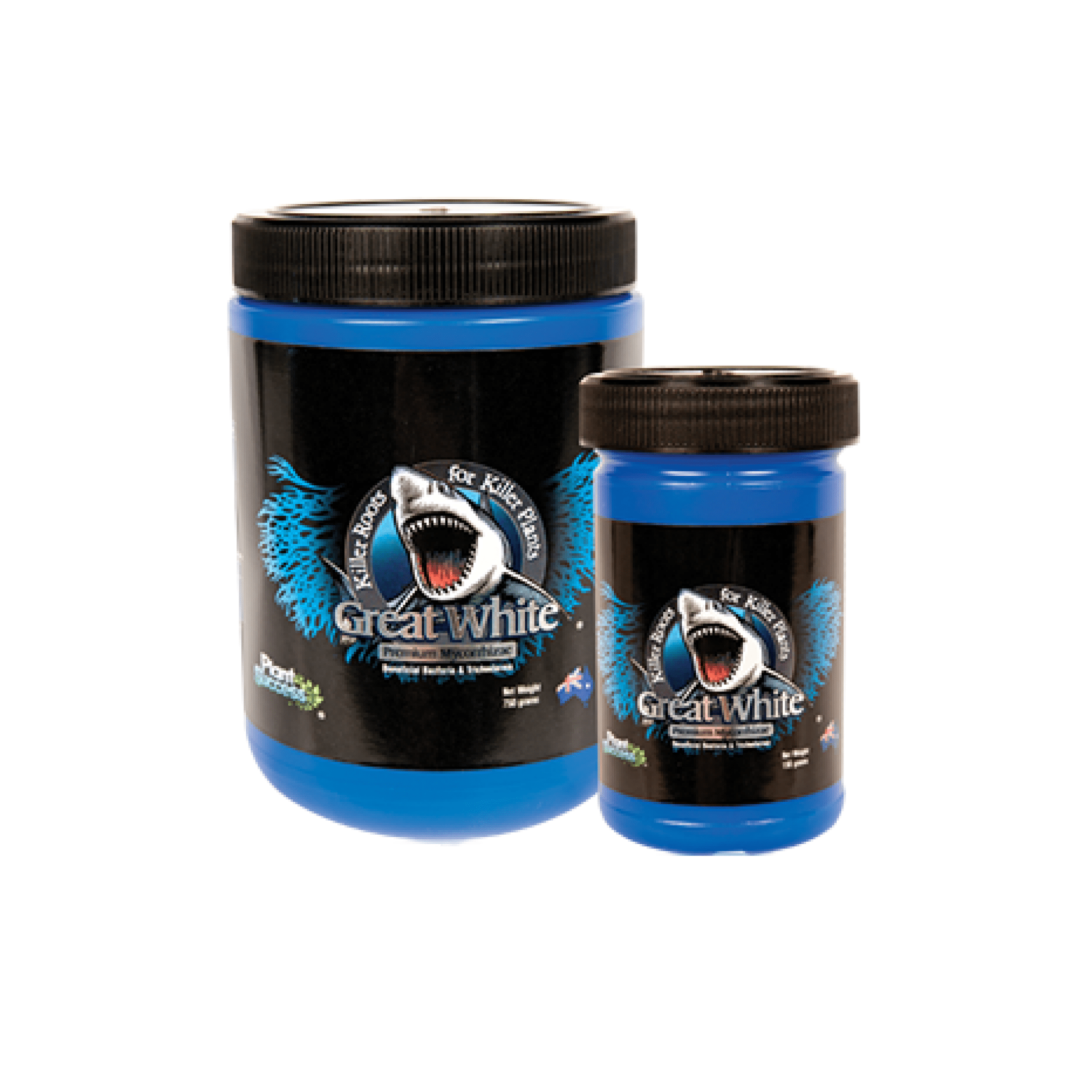Great White is the market’s most cutting-edge premium mycorrhizae formula. This highly concentrated and diverse blend of beneficial microbes will help boost your plants’ root systems, leading to greater water retention and nutrient uptake.
Mycorrhizae form a type of symbiotic relationship between fungi and plant roots. The fungi colonize the roots and form a network of filaments called mycelium. In exchange for sugars produced by the plant, the mycorrhizae help to increase the surface area of the roots, improve water and nutrient uptake, and protect the roots from pathogens.
For gardeners, this symbiotic relationship can be beneficial in several ways. First, it can help to improve the health of plants by providing them with additional nutrients and water. Second, it can help to reduce the need for chemical fertilizers and pesticides. Finally, it can help to improve soil structure and increase the population of beneficial microorganisms. Consequently, mycorrhizae play an important role in sustainable gardening practices.
How To Use
Great White can be used in all stages and all growing types. Use weekly for best results.
Seeds: Lightly dust with Great White.
Cuttings: Dip cutting into rooting gel/solution then lightly dip directly into Great White powder. Mix into pre-soak/fertilizer solution at a rate of 1 tsp or 3.3 grams per 2 gallons 7.5 litres of water.
Transplanting: Lightly dust planting hole and place plant directly on top.
Soil, Coco and Topfeeding: Apply at a rate of 1 tsp (3.3 grams per 2 gallons (9 litres) of water.
Hydroponics: Mix into reservoir with regular feeding at a rate of 1 tsp (3.3 grams) per 10 gallons (38 litres) of water.*
*Hydroponic users may find settling or particles on bottom of reservoir and should not be concerned of product loss; it’s normal for the carrying agent to settle.
Ingredients
Endomycorrhiza
Glomus aggregatum – 83 props per gram
Glomus intraradices – 83 props per gram
Glomus mosseae – 83 props per gram
Glomus etunicatum – 83 props per gram
Glomus clarum – 11 props per gram
Glomus monosporum – 11 props per gram
Paraglomus brazilianum – 11 props per gram
Glomus deserticola – 11 props per gram
Gigaspora margarita – 11 props per gram
Ectomycorrhiza
Pisolithus tinctorious – 187,875 propagules per gram
Rhizopogon luteolus – 5,219 props per gram
Rhizopogon fulvigleba – 5,219 props per gram
Rhizopogon villosullus – 5,219 props per gram
Rhizopogon amylopogon – 5,219 props per gram
Scleroderma citrinum – 5,219 props per gram
Scleroderma cepa – 5,219 props per gram
Bacteria
Azotobacter chroococcum – 525,000 CFU’s per gram
Bacillus subtilis – 525,000 CFU’s per gram
Bacillus licheniformis – 525,000 CFU’s per gram
Bacillus azotoformans – 525,000 CFU’s per gram
Bacillus megaterium – 525,000 CFU’s per gram
Bacillus coagulans – 525,000 CFU’s per gram
Bacillus pumilus – 525,000 CFU’s per gram
Bacillus amyloliquefaciens – 525,000 CFU’s per gram
Paenibacillus durum – 525,000 CFU’s per gram
Paenibacillus polymyxa – 525,000 CFU’s per gram
Pseudomonas aureofaciens – 525,000 CFU’s per gram
Pseudomonas fluorescens – 525,000 CFU’s per gram
Contains the following 3 species
Trichoderma koningii-187,875 CFU’s per gram
Trichoderma harzianum-125,250 CFU’s per gram
Saccharomyces cerevisiae – 525,000 CFU’s per gram


